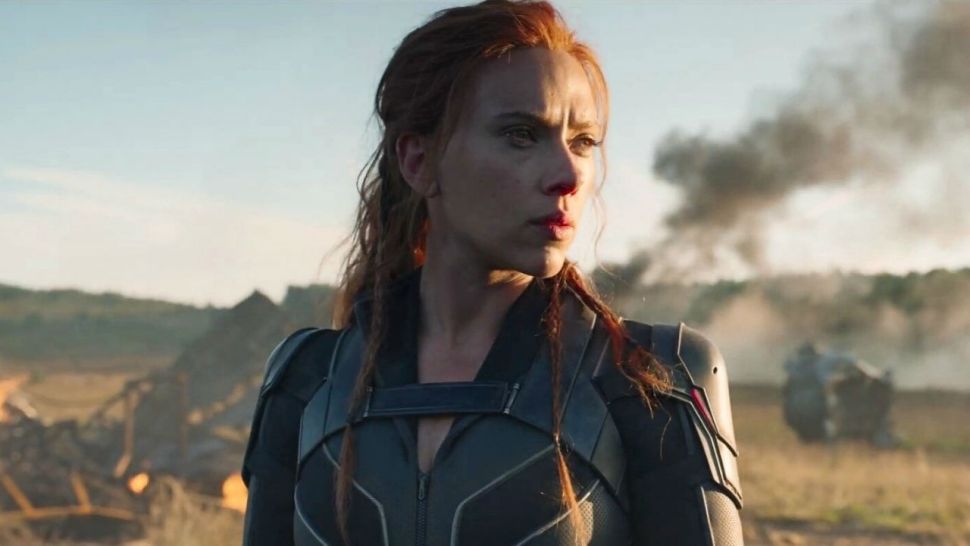Is Black Widow's Disney Plus release the future of how we watch movies?
Opinion: We hope not

Sign up for breaking news, reviews, opinion, top tech deals, and more.
You are now subscribed
Your newsletter sign-up was successful
Black Widow is releasing simultaneously in theaters and on Disney Plus – for an extra fee – in July, and this film feels like it's been coming out forever. The first trailer was released back in 2019, and the pandemic has been bumping the next Marvel Cinematic Universe movie down the release schedule for almost 12 months now.
Black Widow feels like it'll be the biggest test of Disney Plus's Premier Access model yet – something it's tested with the live-action Mulan movie and Raya and the Last Dragon, but not with a dead-cert box office smash like a MCU title. In essence, while Disney has framed the decision as "serving the evolving preferences of audiences", this is exactly how the company will learn if it can make the same amount of money releasing its movies theatrically as it can via its own direct streaming business.
It could be enormously influential when it comes to future decision-making – even if the decision seems like it's only been made because theaters are still closed in many countries. But how do you feel about a future where you could be paying $30/£20 per movie at home instead of heading to the theater? Is this what the future of cinema should look like?
We don't think so. But for now at least, the option is genuinely welcome.
- Find out how to watch Black Widow
- Best Disney Plus shows
- When is the next episode of The Falcon and the Winter Soldier?
The pros and cons

Marvel and Disney were bound to hit a point where they had to release Black Widow eventually. That's because the Marvel Cinematic Universe is mostly moving ahead on TV this year via Disney Plus, and the entire enterprise is contingent on having an interconnected series of stories and characters. Every delay or change presumably has a knock-on effect for a massive calendar of Marvel production.
Black Widow probably had to release at some point this year, before other shows and movies could roll out. That seems particularly true in the case of the Hawkeye TV show, which reportedly features an appearance from Black Widow's Florence Pugh as Yelena Belova, and is due to release later this year. Clearly, the intent is that this character is meant to be introduced in Black Widow before she starts showing up elsewhere.
Not every MCU project is this intimately connected – it's not like WandaVision needed Black Widow to release for any of its story to make sense – but an eventual overlap was kind of inevitable, even if Black Widow is technically set after Captain America: Civil War. From a storytelling point of view, then, releasing the film this July probably makes sense.
Sign up for breaking news, reviews, opinion, top tech deals, and more.
Now, what about that price tag for Disney Plus Premier Access? As it stands, both Raya and Mulan cost $29.99 / £19.99 / $34.99 / €21.99 on top of a Disney Plus subscription, and we'd be surprised if Black Widow deviated from that, though Disney hasn't revealed a price yet.
The value of this will largely be determined by how big a Marvel fan you are, and how many people you're likely to watch the movie with. Families feel like the biggest beneficiaries of this price point, and the easy comparison here is theater ticket prices, which vary wildly depending on where you're living. For TechRadar's UK office in Bath, it's upwards of £10 just for one adult ticket at peak hours. Two people watching Black Widow together, then, feels like pretty reasonable value by comparison, especially because you can rewatch it as many times as you like; and for a whole family, it's even better value.
As of late 2019, US theater ticket prices averaged a little over $9, although again this is entirely shaped by where you live. If you want to go see The Courier at AMC Porter Ranch 9 in California today, for example, it's $15.49 for an adult ticket, and $12.49 for a child ticket. Compared to that, Black Widow's price again doesn't seem so bad.
Of course, there are some factors here that go beyond straight price comparisons. Paying $30 for Black Widow might seem arbitrary when the likes of Pixar's Soul or Hamilton roll out as part of your basic subscription fee – not to mention WandaVision and The Falcon and the Winter Soldier, which are also included, and which are movie-quality MCU shows that clearly cost a fortune to make, just like Black Widow.
The logic of Disney charging extra for a movie it spent hundreds of millions of dollars producing, with the expectation it would probably make more than a billion dollars back, clearly makes sense to it.
From a consumer point of view, though, it's a pretty big price difference when the content arguably looks similar in quality. That might be a bugbear for some subscribers, at which point they're better off waiting for the movie to release generally on Disney Plus, likely months down the line.
Our take? This isn't the future we ultimately want
Right now, we think this is a pretty good call – we'd rather have had the option to watch Black Widow last year, when we were particularly bored indoors in the wake of theaters being closed. But this is nonetheless a solid compromise, and fans will still have the option to see it in theaters.
Long-term, however, the ritual of visiting cinemas is very precious to us – and while in this case we're happy with the flexibility, the MCU is all about the big screen. Disney referenced the recovering theatrical market in its announcement for Black Widow, and even if its strategy with Disney Plus releases looks like it'll continue to vary in the near future, it's still the world's biggest studio at the box office. The theatrical experience is vital to it, too.
Much as we love the Disney Plus Marvel shows so far, the big screen is absolutely core to the MCU experience. $30 for Black Widow is fine by us – but this is what we eventually want to get back to:
A streaming service gives you choice, but it can't give you that.

Samuel is a PR Manager at game developer Frontier. Formerly TechRadar's Senior Entertainment Editor, he's an expert in Marvel, Star Wars, Netflix shows and general streaming stuff. Before his stint at TechRadar, he spent six years at PC Gamer. Samuel is also the co-host of the popular Back Page podcast, in which he details the trials and tribulations of being a games magazine editor – and attempts to justify his impulsive eBay games buying binges.